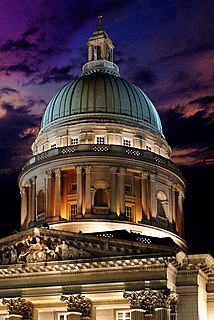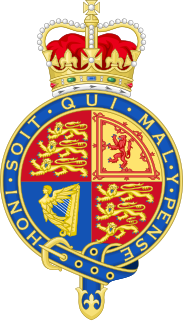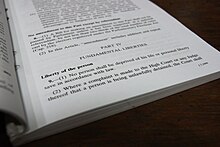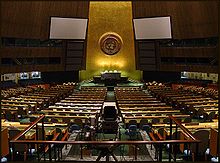
The Constitution of the Republic of Singapore is the supreme law of Singapore. A written constitution, the text which took effect on 9 August 1965 is derived from the Constitution of the State of Singapore 1963, provisions of the Federal Constitution of Malaysia made applicable to Singapore by the Republic of Singapore Independence Act 1965, and the Republic of Singapore Independence Act itself. The text of the Constitution is one of the legally binding sources of constitutional law in Singapore, the others being judicial interpretations of the Constitution, and certain other statutes. Non-binding sources are influences on constitutional law such as soft law, constitutional conventions, and public international law.
The Internal Security Act 1960 was a preventive detention law in force in Malaysia. The legislation was enacted after the Federation of Malaya gained independence from Britain in 1957. The ISA allows for detention without trial or criminal charges under limited, legally defined circumstances. On 15 September 2011, the Prime Minister of Malaysia, Najib Razak said that this legislation will be repealed and replaced by two new laws. The ISA was replaced and repealed by the Security Offences Act 2012 which has been passed by Parliament and given the royal assent on 18 June 2012. The Act came into force on 31 July 2012.
Preventive detention is an imprisonment that is putatively justified for non-punitive purposes, most often to prevent (further) criminal acts.

The Criminal Law Act is a Singapore statute that, among other things, allows the executive branch of the Government of Singapore to order that suspected criminals be detained without trial. It was introduced in 1955 during the colonial era and intended to be a temporary measure, but has since been renewed continuously; the Government has declined to make it permanent, claiming it "believe[s] that the Act should be explicitly extended by Parliament every five years". The validity of the Act was most recently extended in February 2018, and it will remain in force till October 2024.

The Internal Security Act (ISA) of Singapore is a statute that grants the executive power to enforce preventive detention, prevent subversion, suppress organized violence against persons and property, and do other things incidental to the internal security of Singapore. The present Act was originally enacted by the Parliament of Malaysia as the Internal Security Act 1960, and extended to Singapore on 16 September 1963 when Singapore was a state of the Federation of Malaysia.

The Constitution of the Republic of Singapore Tribunal was established in 1994 pursuant to Article 100 of the Constitution of the Republic of Singapore. Article 100 provides a mechanism for the President of Singapore, acting on the advice of the Singapore Cabinet, to refer to the Tribunal for its opinion any question as to the effect of any provision of the Constitution which has arisen or appears to likely to arise. Questions referred to the Tribunal may concern the validity of enacted laws or of bills that have not yet been passed by Parliament.

Article 12 of the Constitution of the Republic of Singapore guarantees to all persons equality before the law and equal protection of the law. The Article also identifies four forbidden classifications – religion, race, descent and place of birth – upon which Singapore citizens may not be discriminated for specific reasons. For example, discrimination on those classifications is prohibited in the appointment to any office or employment under a public authority or in the administration of any law relating to the establishing or carrying on of any trade, business, profession, vocation or employment.

Article 9 of the Constitution of the Republic of Singapore, specifically Article 9(1), guarantees the right to life and the right to personal liberty. The Court of Appeal has called the right to life the most basic of human rights, but has yet to fully define the term in the Constitution. Contrary to the broad position taken in jurisdictions such as Malaysia and the United States, the High Court of Singapore has said that personal liberty only refers to freedom from unlawful incarceration or detention.

Article 15 of the Constitution of the Republic of Singapore guarantees freedom of religion in Singapore. Specifically, Article 15(1) states: "Every person has the right to profess and practise his religion and to propagate it."

Chng Suan Tze v. Minister for Home Affairs is a seminal case in administrative law decided by the Court of Appeal of Singapore in 1988. The Court decided the appeal in the appellants' favour on a technical ground, but considered obiter dicta the reviewability of government power in preventive detention cases under the Internal Security Act ("ISA"). The case approved the application by the court of an objective test in the review of government discretion under the ISA, stating that all power has legal limits and the rule of law demands that the courts should be able to examine the exercise of discretionary power. This was a landmark shift from the position in the 1971 High Court decision Lee Mau Seng v. Minister of Home Affairs, which had been an authority for the application of a subjective test until it was overruled by Chng Suan Tze.

Teo Soh Lung v Minister for Home Affairs is the name of two cases of the Singapore courts, a High Court decision delivered in 1989 and the 1990 judgment in the appeal from that decision to the Court of Appeal. The cases were concerned with the constitutionality of amendments made to the Constitution of the Republic of Singapore and the Internal Security Act ("ISA") in 1989. The latter statute authorizes detention without trial on security grounds. These amendments had the effect of changing the law on judicial review of executive discretion under the ISA by re-establishing the subjective test enunciated in the 1971 High Court decision Lee Mau Seng v Minister for Home Affairs which had been overruled in 1988 by Chng Suan Tze v Minister for Home Affairs, and limiting the right of judicial review to ensuring compliance with procedures specified in the ISA. In other words, the amendments were intended to render the exercise of power by the President and the Minister for Home Affairs under the ISA to detain persons without trial not justiciable by the courts. Both the High Court and Court of Appeal found that these amendments were constitutional because Parliament had done nothing more than enact the rule of law relating to the law applicable to judicial review. Thus, the amendments validly operated to deprive the applicant Teo Soh Lung of the ability to apply to the courts for judicial review.

Yong Vui Kong is a Malaysian citizen of Hakka descent who was sentenced to death in Singapore for trafficking more than 15 grams of heroin in 2007. His sentence was reduced to life imprisonment and caning as a result of Singapore's amendments to the Misuse of Drugs Act.

In Singapore, the rule of law doctrine has been the topic of considerable disagreement and debate, largely through differing conceptions of the doctrine. These conceptions can generally be divided into two categories developed by legal academics, the "thin", or formal, conception and the "thick", or substantive, conception of the rule of law. The thin conception, often associated with the legal scholars Albert Venn Dicey and Joseph Raz, advocates the view that the rule of law is fulfilled by adhering to formal procedures and requirements, such as the stipulations that all laws be prospective, clear, stable and constitutionally enacted, and that the parties to legal disputes are treated equally and without bias on the part of judges. While people subscribing to the thin conception do not dismiss the importance of the content of the law, they take the view that this is a matter of substantive justice and should not be regarded as part of the concept of the rule of law. On the other hand, the thick conception of the rule of law entails the notion that in addition to the requirements of the thin rule, it is necessary for the law to conform with certain substantive standards of justice and human rights.

Yong Vui Kong v. Public Prosecutor was a seminal case decided in 2010 by the Court of Appeal of Singapore which, in response to a challenge by Yong Vui Kong, a convicted drug smuggler, held that the mandatory death penalty imposed by the Misuse of Drugs Act ("MDA") for certain drug trafficking offences does not infringe Articles 9(1) and 12(1) of the Constitution of Singapore.

Article 14 of the Constitution of the Republic of Singapore, specifically Article 14(1), guarantees to Singapore citizens the rights to freedom of speech and expression, peaceful assembly without arms, and association. However, the enjoyment of these rights may be restricted by laws imposed by the Parliament of Singapore on the grounds stated in Article 14(2) of the Constitution.

Ong Ah Chuan v Public Prosecutor is a landmark decision delivered in 1980 by the Judicial Committee of the Privy Council on appeal from Singapore which deals with the constitutionality of section 15 of the Misuse of Drugs Act 1973 ("MDA"), and the mandatory death penalty by the Act for certain offences. The appellants contended that the presumption of trafficking under section 15 of the MDA violated Article 9(1) of the Constitution of the Republic of Singapore and that the mandatory death penalty was arbitrary and violated Article 12(1) of the Constitution.

Chan Hiang Leng Colin v. Public Prosecutor is a 1994 judgment of the High Court of Singapore delivered by Chief Justice Yong Pung How which held that orders issued by the Government deregistering the Singapore Congregation of Jehovah's Witnesses under the Societies Act and banning works published by the Watch Tower Bible and Tract Society ("WTBTS") under the Undesirable Publications Act did not violate the right to freedom of religion guaranteed by Article 15(1) of the Constitution of Singapore.

The remedies available in a Singapore constitutional claim are the prerogative orders – quashing, prohibiting and mandatory orders, and the order for review of detention – and the declaration. As the Constitution of the Republic of Singapore is the supreme law of Singapore, the High Court can hold any law enacted by Parliament, subsidiary legislation issued by a minister, or rules derived from the common law, as well as acts and decisions of public authorities, that are inconsistent with the Constitution to be void. Mandatory orders have the effect of directing authorities to take certain actions, prohibiting orders forbid them from acting, and quashing orders invalidate their acts or decisions. An order for review of detention is sought to direct a party responsible for detaining a person to produce the detainee before the High Court so that the legality of the detention can be established.

Exclusion of judicial review has been attempted by the Parliament of Singapore to protect the exercise of executive power. Typically, this has been done though the insertion of finality or total ouster clauses into Acts of Parliament, or by wording powers conferred by Acts on decision-makers subjectively. Finality clauses are generally viewed restrictively by courts in the United Kingdom. The courts there have taken the view that such clauses are, subject to some exceptions, not effective in denying or restricting the extent to which the courts are able to exercise judicial review. In contrast, Singapore cases suggest that ouster clauses cannot prevent the High Court from exercising supervisory jurisdiction over the exercise of executive power where authorities have committed jurisdictional errors of law, but are effective against non-jurisdictional errors of law.

Separation of powers in Singapore is founded on the concept of constitutionalism, which is itself primarily based upon distrust of power and thus the desirability of limited government. To achieve this, the Constitution of the Republic of Singapore splits the power to govern the country between three branches of government – the legislature, which makes laws; the executive, which executes them; and the judiciary, which enforces them. Each branch, while wielding legitimate power and being protected from external influences, is subjected to a system of checks and balances by the other branches to prevent abuse of power. This Westminster constitutional model was inherited from the British during Singapore's colonial years.




















